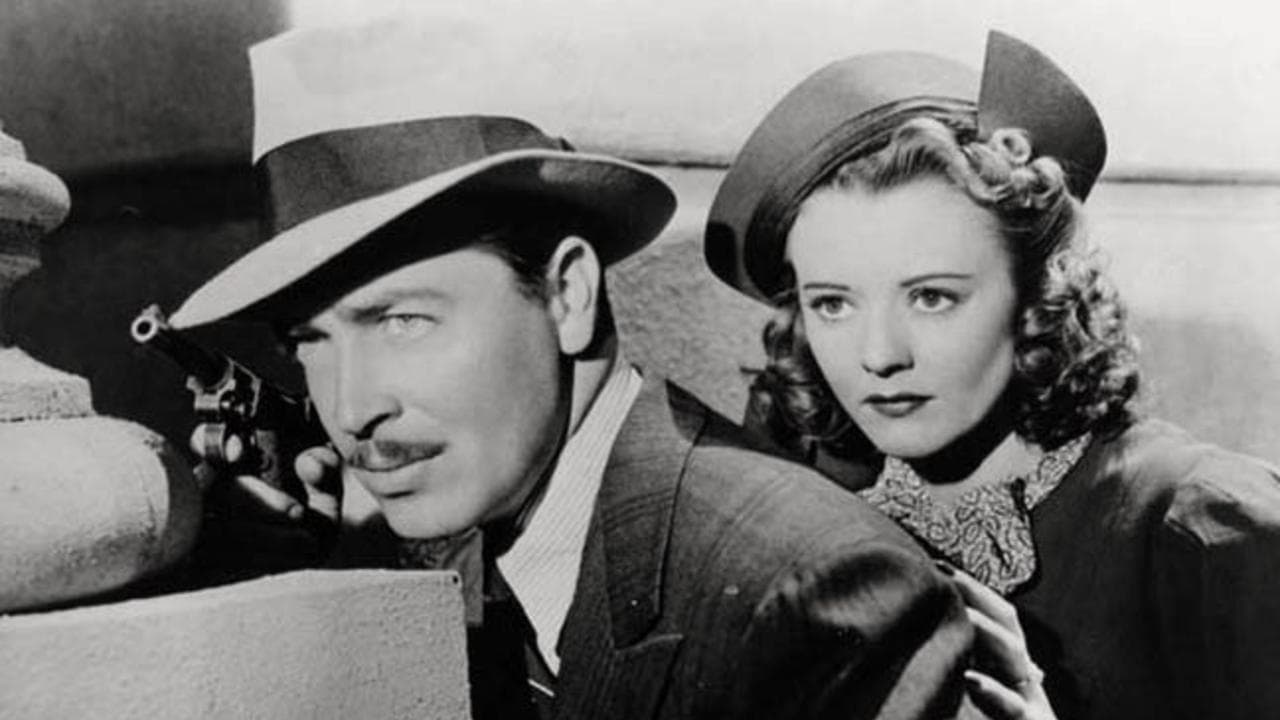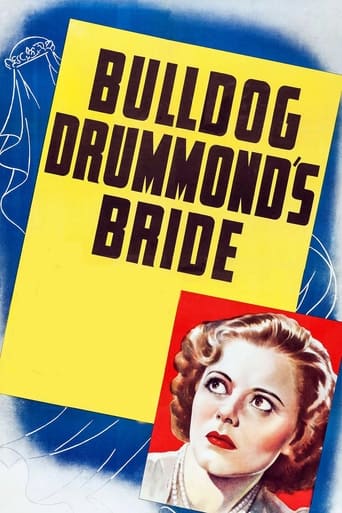

The final Bulldog Drummond movie in the Paramount series stars John Howard and finally has Drummond marrying longtime fiancée Phyllis (the delightful Heather Angel). But before they get hitched there's another last-minute interruption in the form of a bank robber, a radio, and a trip to France. The cast of regulars (Reginald Denny, E.E. Clive, H.B. Warner, and Elizabeth Patterson) are all fine. Eduardo Ciannelli plays the villain and hams it up nicely. There's even more comedy than usual in this one. Some of it is funny but most of it is just stupid, particularly where Algy is concerned.Bulldog Drummond would return to the movies after WW2. First at Columbia, then Fox and MGM, with yet more actors playing the role (including Tom Conway and Walter Pidgeon). But none of those would be quite as enjoyable as the Paramount series. Which isn't saying a lot since these movies were never better than time-passers anyway. But I can honestly say I never found any of the movies bad, just ranging from 'ok' to good. Even this final one, while weaker than the others, is still watchable. And it's not even an hour long so it's hard to argue against giving it a shot when you have time to kill.
... View MoreBulldog Drummond's Bride has John Howard teetering once again on the steps of matrimony. Will he get another postponement because some daring crime caper needs him and his expertise to help Scotland Yard? Will Heather Angel finally get him signed, sealed, and delivered at the altar?A very daring bank robbery in broad daylight is pulled off by Eduardo Ciannelli using nitroglycerin like bottle bombs. And in getting away Ciannelli comes to Drummond's new flat as a painter and pulls a crazy act to get away, but not before stashing the loot.The accent is more on comedy on this one as Howard, best friend Reginald Denny, and butler E.E. Clive pursue Ciannelli to France where he has fled in pursuit of the loot which he stashed in a radio that Heather Angel took to the continent.This entry in the Drummond series borders on the silly at times, still fans of the series will like it.
... View MorePhyllis and Hugh "Bulldog" Drummond again try to be married in 1939's "Bulldog Drummond's Bride," the last of this particular Bulldog Drummond series.When robbers blow up a London bank and steal 10,000 pounds, they hide the money in a radio. That radio, however, is in the apartment that Phyllis and Hugh will live in once they are married - should that event ever take place. Naturally Hugh is up to his neck in trying to solve this robbery and chasing down the radio. Phyllis waits, promising Hugh that she intends to be married to someone else the next day after their wedding should that not occur.These films had a jaunty, fun feel to them because of the cast - John Howard is a delightful, easygoing and dapper Bulldog Drummond, the lovely Heather Angel is the long-suffering Phyllis, E.E. Clive is Tenny the butler, and Reginald Denny is Algy.This particular film relies a lot on comedy and slapstick, with poor Denny getting the brunt of it. The mystery takes a back seat. However, I still found this enjoyable. I've only seen one other Bulldog Drummond, "Arrest Bulldog Drummond," and I'd like to see more. The print quality isn't particularly good, but they're still fun.
... View MoreThis is the sixteenth of the Bulldog Drummond films, and it brings to an end the Drummond films as they were before the outbreak of World War II. (They would resume in 1947.) With this film, John Howard also ends his career as Drummond, which had lasted for seven films, all made within two breathless years between September of 1937 and September of 1939. Heather Angel once again plays Phyllis Clavering, E. E. Clive plays Tenny the Butler, Reginald Denny plays Algy Longworth, and H. B. Warner plays Commissioner Nielson, all for the last time. John Howard left the film business to join the U. S. Navy (he was an American), where he ended up winning the Navy Cross and the French Croix de Guerre for conspicuous acts of bravery, becoming in other words a real life hero of the sort he had played in the Drummond films. After the War, he returned to acting but was never again fortunate to shine as a major player. It seems a poor return for a fictional Drummond who became a real Drummond, that he could not resume the role. E. E. Clive died the next year, in 1940. Reginald Denny contributed to the War effort by manufacturing 15,000 target drones for the U. S. Army. He later returned to acting, but was never in another Drummond film. H. B. Warner and Heather Angel went on acting, but they never appeared in another Drummond film either. The team was totally broken up, and 'vintage 1930s Drummond' was over. This film is moderately entertaining, with lots of comedy, so that it is not actually serious. What with people having cans of paint thrown over them and slipping and sliding, Algy staging pratfalls continually, and other such antics, there is barely room for a mystery plot. However, Drummondians will be thrilled to know that ... oh no, I must not say ... that business which was continually being interrupted between Hugh and Phyllis, ... well, that must remain a mystery. The plot, what there is of it, concerns a ruthless villain who has robbed a bank for what then was considered a vast sum, of ten thousand pounds. It is hard to conceive of a time when that was a sum worth getting excited about, worth exploding bombs all over the place, killing people without compunction, and carrying on as if all the gold of the Indies were at stake. But that was then, and this is now. In this film as in so many others of the time, Scotland Yard 'seal off an area with a cordon, and no one can get through'. It seems incredible, doesn't it, that it was even remotely conceivable to seal off a sector of London like that just for a measly little bank robbery? Naturally, the villain gets away in an ambulance disguised as a madman. Maybe it really was time for the world to move on and get real. After this, there were tanks and planes and the Holocaust to worry about, and whether Hugh and Phyllis got married or not was no longer important, with so many women widowed that Phyllis having to wait for another crime to be solved no longer qualified as a tragedy.
... View More